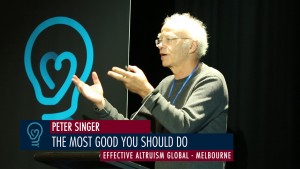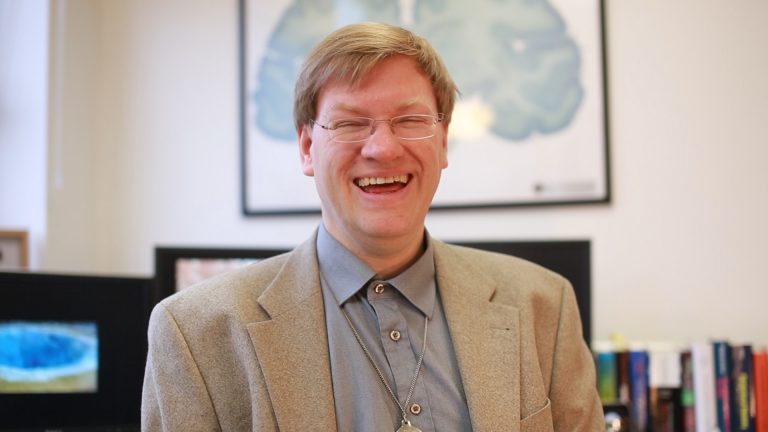Suffering, and Progress in Ethics – Peter Singer
 Suffering is generally bad – Peter Singer (who is a Hedonistic Utilitarian), and most Effective Altruists would agree with this. Though in addressing the need for suffering today Peter acknowledges that, as we are presently constituted, suffering is useful as a warning sign (e.g. against further injury). But what about the future?
Suffering is generally bad – Peter Singer (who is a Hedonistic Utilitarian), and most Effective Altruists would agree with this. Though in addressing the need for suffering today Peter acknowledges that, as we are presently constituted, suffering is useful as a warning sign (e.g. against further injury). But what about the future?
What if we could eliminate suffering?
Perhaps in the future we will have advanced technological interventions to warn us of danger that will be functionally similar to suffering, but without the nasty raw feels.
Peter Singer, like David Pearce, suggests that if we could eliminate suffering of non-human animals that are capable of suffering, perhaps in some way that is difficult to imagine now – that this would be a good thing.
Singer thinks it is interesting to speculate what might be possible for the future of human beings, if we do survive over the longer term. To what extent are we going to be able to enhance ourselves? In particular to what extent are we going to be more ethical human beings – which brings to question ‘Moral Enhancement’.
 Have we made Progress in Ethics? Peter argues for the case that our species has expanded the circle of our ethical concern we have in his book ‘The Expanding Circle‘, and more recently Steven Pinker took up this idea in ‘Better Angels Of Our Nature’ – and this has happened over the millennia, beyond initially the tribal group, then to a national level, beyond ethnic groups to all human beings, and now we are starting to expand moral concern to non-human sentient beings as well.
Have we made Progress in Ethics? Peter argues for the case that our species has expanded the circle of our ethical concern we have in his book ‘The Expanding Circle‘, and more recently Steven Pinker took up this idea in ‘Better Angels Of Our Nature’ – and this has happened over the millennia, beyond initially the tribal group, then to a national level, beyond ethnic groups to all human beings, and now we are starting to expand moral concern to non-human sentient beings as well.
Steven Pinker thinks that increases in our ethical consideration is bound up with increases in our intelligence (as proposed by James Flynn – the Flynn Effect – though this research is controversial (it could be actual increases in intelligence or just the ability to do more abstract reasoning)) and increases in our ability to reason abstractly.
As mentioned earlier there are other ways in which we may increase our ability and tendency to be more moral (see Moral Enhancement), and in the future we may discover genes that may influence us to think more about others, to dwell less on negative emotions like anger or rage. It is hard to say whether people will use these kinds of moral enhancers voluntarily, or whether we need state policies to encourage people to use moral enhances in order to produce better communities – and there are a lot of concerns here that people may legitimately have about how the moral enhancement project takes place. Peter sees this as a fascinating prospect and that it would be great to be around to see how things develop over the next couple of centuries.
Note Steven Pinker said of Peter’s book:
The Expanding Circle
Abstract: What is ethics? Where do moral standards come from? Are they based on emotions, reason, or some innate sense of right and wrong? For many scientists, the key lies entirely in biology–especially in Darwinian theories of evolution and self-preservation. But if evolution is a struggle for survival, why are we still capable of altruism?
 In his classic study The Expanding Circle, Peter Singer argues that altruism began as a genetically based drive to protect one’s kin and community members but has developed into a consciously chosen ethic with an expanding circle of moral concern. Drawing on philosophy and evolutionary psychology, he demonstrates that human ethics cannot be explained by biology alone. Rather, it is our capacity for reasoning that makes moral progress possible. In a new afterword, Singer takes stock of his argument in light of recent research on the evolution of morality.
In his classic study The Expanding Circle, Peter Singer argues that altruism began as a genetically based drive to protect one’s kin and community members but has developed into a consciously chosen ethic with an expanding circle of moral concern. Drawing on philosophy and evolutionary psychology, he demonstrates that human ethics cannot be explained by biology alone. Rather, it is our capacity for reasoning that makes moral progress possible. In a new afterword, Singer takes stock of his argument in light of recent research on the evolution of morality.
References:
The Expanding Circle book page at Princeton University: http://press.princeton.edu/titles/9434.html
The Flynn Effect: http://en.wikipedia.org/wiki/Flynn_effect
Peter Singer – Ethics, Evolution & Moral Progress – https://www.youtube.com/watch?v=91UQAptxDn8
For more on Moral Enhancement see Julian Savulescu’s and others writings on the subject.
Subscribe to this Channel: http://youtube.com/subscription_center?add_user=TheRationalFuture
Science, Technology & the Future: http://scifuture.org







